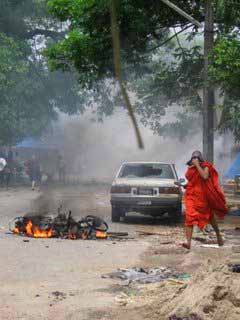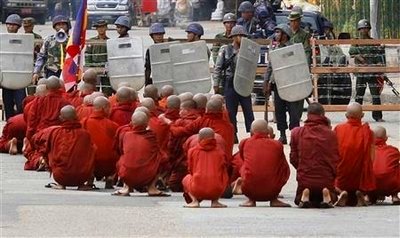For over two decades, campaigners around the world worked for the freedom of a man who has come to symbolize human rights. At many times the struggle to free Nelson Mandela and all the people of South Africa seemed bleak. South Africans faced an unyielding apartheid government, while international campaigners dealt with intransigent governments that placed narrowly defined geopolitical interests above self-determination for the people of South Africa. Yet activists both inside South Africa and internationally rose to the occasion, ultimately defeating apartheid with nonviolent resistance and peaceful political defiance.
In the Southeast Asian country of Burma, the struggle for human rights and democracy parallels the effort shown by South Africa. This time, the face of the struggle is Aung San Suu Kyi, the only imprisoned Nobel Peace Prize laureate. Her dedication to promoting democracy and human rights in Burma is comparable to Mandela's in South Africa.
Last year, Burma experienced one of the most brutal crackdowns on nonviolent protesters in recent history, as well as a devastating cyclone, whose effects were worsened by the military dictatorship's refusal of adequate international relief.
 Yet in September 2007, those at U.S. Campaign for Burma (USCB) and others working for human rights in Burma sighed with relief as one of their longtime efforts came to fruition: A group of world powers, including the U.S. and China, called for the first time for Burma's military junta to release all political prisoners, including Suu Kyi.
Yet in September 2007, those at U.S. Campaign for Burma (USCB) and others working for human rights in Burma sighed with relief as one of their longtime efforts came to fruition: A group of world powers, including the U.S. and China, called for the first time for Burma's military junta to release all political prisoners, including Suu Kyi.
This call by the U.N. Security Council represents a significant victory for Burma's nonviolent struggle for democracy, since Burma activists believe the United Nations must play a major role in Burma's transition from military rule. The United Nations serves as a platform in which the United States, China, Burma's military junta, Suu Kyi's movement, and other players can ultimately solidify a nonviolent route to a democratic form of government. By calling for all political prisoners to be freed, the U.N. Security Council has created a benchmark for this effort to move forward.
The movement at the United Nations didn't happen in a vacuum - the Burmese people earned it with their struggle and sacrifice. The Burmese Buddhist monks who filled the streets during the Saffron Revolution of 2007 produced intense pressure on the United Nations to make the call for the release of all political prisoners. Outrage at the violent crackdown on the Saffron Revolution sparked meetings of the U.S. Congress, British Parliament, and U.N. Security Council; also, China held its first press conference dedicated to policy toward Burma (unfortunately, China mostly defended its close friendship with Burma's military junta).
The monks did not stand alone. For 20 years, overseas Burmese activists and their allies have created a network of pro-democratic groups in 35 countries around the world. Their job is to promote the cause of democracy and human rights in Burma. As the monks peacefully walked and prayed in the streets of Rangoon and Mandalay, solidarity marches began to spring up in Thailand, England, India, South Africa, the Czech Republic, and the United States.
USE YOUR LIBERTY
This peaceful movement has now sparked the interest of people throughout the world, including those just learning about the situation in Burma. Many are inspired by Suu Kyi's rallying call to the world: "Please use your liberty to promote ours." Suu Kyi's dedication and love for her country and the bravery of the monks have captured the hearts and imaginations of millions of people worldwide.
Suu Kyi's party, the National League for Democracy, won 82 percent of the seats in the country's democratic election in 1990. However, the Burmese military refused to surrender power to her party, instead jailing many of its supporters including Suu Kyi herself. Since her initial arrest, Suu Kyi has been released and re-arrested several times. Despite heavy oppression of her supporters, Suu Kyi's speeches continue to draw tens of thousands in Burma. Her most recent jail term began in May 2003; October 24, 2008, marked her 13th cumulative year imprisoned. She remains a symbol of hope in Burma and around the world.
An overall commitment to nonviolence against the military junta's violent rule has earned the Burmese movement legitimacy and international support. In fact, many members of USCB state they were inspired by such loyalty to nonviolence and believe the struggle will stand alongside the Indian independence movement and Solidarity in Poland as a successful example of nonviolent resistance.
The role of the U.S. Campaign for Burma is to translate this empathy into concrete action by following the example of the international campaign to end South African apartheid. Following the lead of Suu Kyi and inspired by Mandela, USCB campaigned for the successful passage of the Block Burmese JADE Act in the U.S. Congress, which prevents Burma's military junta from earning hundreds of millions of dollars through the sale of rubies and jade to unsuspecting U.S. consumers. USCB has also sought to keep Burma on the radar of the United Nations, which led to the decision to keep Burma on the permanent agenda of the Security Council.
At the same time, since many everyday Burmese people enjoy U.S. pop culture for entertainment, USCB created a series of short videos with U.S. celebrities, including Jim Carrey, Jennifer Aniston, and Jason Biggs. When U.S. celebrities speak out about repression in Burma, it provides great inspiration to people struggling inside the country.
 Students are increasingly playing a leading role in USCB's international grassroots movement. Past and present peaceful revolutions have seen students uniting behind the struggle for human rights, and students in the United States are continuing this tradition. U.S. students have protested against corporations that looked to build ties with the Burmese military junta. Schools across the country, including Harvard University, American University, and the University of California, Berkeley, have created selective purchasing and investment policies seeking to prevent the exchange of university funds with companies that support the military junta. In response to pressure from students and activists, more than 40 U.S. companies ceased doing business that benefits Burma's military regime. In a major step forward, a U.S. Congressional bill has been signed into law: The Burma Freedom and Democracy Act makes it illegal for most U.S. companies to do business that benefits Burma's junta.
Students are increasingly playing a leading role in USCB's international grassroots movement. Past and present peaceful revolutions have seen students uniting behind the struggle for human rights, and students in the United States are continuing this tradition. U.S. students have protested against corporations that looked to build ties with the Burmese military junta. Schools across the country, including Harvard University, American University, and the University of California, Berkeley, have created selective purchasing and investment policies seeking to prevent the exchange of university funds with companies that support the military junta. In response to pressure from students and activists, more than 40 U.S. companies ceased doing business that benefits Burma's military regime. In a major step forward, a U.S. Congressional bill has been signed into law: The Burma Freedom and Democracy Act makes it illegal for most U.S. companies to do business that benefits Burma's junta.
The United Nations remains the USCB's most vital focus. Secretary General Ban Ki-Moon announced he would visit Burma by the end of 2008, but he may not fulfill his promise. The U.S. Campaign for Burma is actively working to ensure he goes and pursues freedom for all political prisoners.
The struggle for human rights in Burma faces many difficult challenges - besides locking up political prisoners, the Burmese junta has destroyed more than 3,200 ethnic villages, forcing millions to flee their homes. The junta has also recruited more child soldiers than any other country in the world.
Yet, inspired by Mandela and the struggle to end apartheid in South Africa, Suu Kyi and the Burmese monks continue to put their lives on the line for human rights and democracy. And, as compassionate activists rallied to Mandela's cause, USCB is determined to build a global campaign to free Aung San Suu Kyi and all the people of Burma.
U.S. Campaign for Burma
www.uscampaignforburma.org



